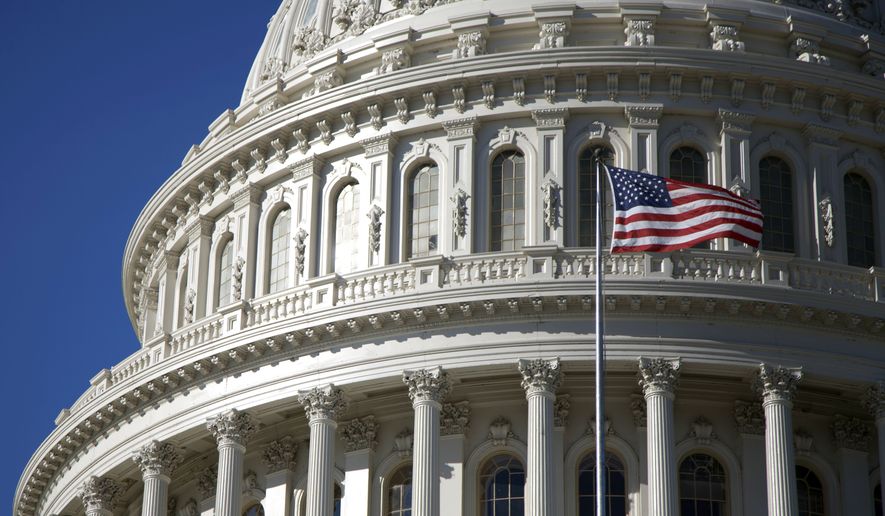The House came up short on Thursday in its bid to propose a balanced budget amendment to the Constitution, with Democrats saying they wouldn’t accept fiscal responsibility lectures from Republicans who have overseen a return to trillion-dollar deficits.
A majority of the House did vote for the amendment, but it fell well short of the two-thirds vote necessary to officially submit the amendment to the states for ratification.
GOP leaders had agreed to hold the vote as part of a deal with conservatives, who said Congress needed to do something to show it was serious about reining in a budget that’s soared over the last five years, pushing the government’s total debt beyond $21 trillion.
The conservatives said an amendment to the Constitution would help Americans understand the gravity of the challenge — and the determination of Congress to live within limits.
“In order for Congress to be able to consistently make the tough decisions necessary to sustain fiscal responsibility, Congress must have the external pressure of a balanced budget requirement to force it to do so,” said Rep. Robert Goodlatte, Virginia Republican and sponsor of the measure.
Democrats, though, saw hypocrisy in the push, coming just months after Republicans powered a $1.5 trillion tax cut through without any Democratic votes, then followed with a bipartisan spending deal that paves the way for $1 trillion in new annual deficits over the next decade.
“Nobody believes anymore that Republicans care about deficit reduction,” said House Minority Whip Steny Hoyer. “I urge my colleagues: defeat this silly waste of time.”
Mr. Hoyer voted for a balanced budget amendment in the 1990s, when it cleared the House but fell just shy in the Senate. By earlier this decade, though, when the issue returned, Mr. Hoyer had changed his stance.
He said the experience of the late 1990s, when President Clinton and a GOP Congress ran several years of surpluses, showed it didn’t take changing the founding document to get there — and he said the experiences since then meant he no longer trusted Republicans to allow for exceptions during emergencies that demanded deficit spending, such as the Wall Street collapse.
Thursday’s largely party-line vote tally was 233-184. Seven Democrats joined 226 Republicans to vote yes, and six Republicans sided with 178 Democrats in voting no.
The amendment would have prevented the government from spending more money than it collects in any given year. Breaking that rule would require a three-fifths majority vote in both the House and Senate.
Congress could waive the requirement during a time of war or national emergency with simple majority votes in the House and Senate.
Raising the federal government’s debt ceiling would also require a three-fifths majority in both chambers.
The president would also have to submit a balanced budget proposal to Congress each year.
The newfound push for fiscal restraint comes just days after the Congressional Budget Office reported that the tax cuts and recent $1.3 trillion spending bill will help send federal deficits soaring above $1 trillion by 2020 and beyond.
Even some Republicans said they need to do more to be taken seriously as deficit hawks.
Sen. David Perdue, who has pushed similar amendments in the Senate, said a serious effort to rein in federal spending will also require major changes to the current stopgap federal budgeting process.
“Let’s not kid ourselves here,” said Mr. Perdue, Georgia Republican. “Passing a balanced budget amendment alone will not solve our country’s debt crisis.”
Some conservative pressure groups said this week’s vote was for show.
“If Republican leadership is serious about balancing the budget, they should have started by cutting spending when they had the chance,” said Adam Brandon, president of the conservative advocacy group FreedomWorks.
Still, Senate Majority Leader Mitch McConnell said earlier this week that he’d take a look at making a similar push in the Senate.
“Most of my members think a balanced budget amendment would bring the kind of discipline that has been missing under administrations of both parties,” the Kentucky Republican said.
Even with one-party control of Washington, amending the Constitution is incredibly difficult, requiring a two-thirds majority in both the House and the Senate, as well as support from three-quarters of the states.
The House and the Senate have held floor votes on a balanced budget amendment a handful of times since the 1980s, and Congress came within a single Senate vote of securing a two-thirds majority in both chambers in 1995.
But lawmakers haven’t gotten as close in recent years, as Democrats have become less willing to sign onto what have generally been Republican-led pushes.
The 300-132 House vote in 1995 won support from 72 Democrats.
In 2011, the GOP-controlled House voted 261-165 to approve one — short of the two-thirds majority necessary — in a vote that won support from 25 Democrats.
A Republican plan also failed in 2011 on a 47-53 vote in the Senate, which was then controlled by Democrats.
• David Sherfinski can be reached at dsherfinski@washingtontimes.com.




Please read our comment policy before commenting.